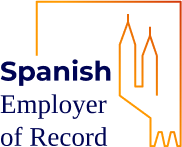14 February 2025
How to manage a remote workforce in Spain: legal and HR best practices
With remote work becoming increasingly prevalent, more businesses are embracing flexible workforce models, particularly in popular destinations like Spain. The country’s appeal as a base for remote teams stems from its strong infrastructure, high quality of life, and skilled talent pool. However, managing a remote workforce in Spain comes with its own set of challenges, particularly when dealing with local legal framework, tax obligations, and HR processes.
This guide provides an in-depth look at the legal and human resources considerations companies must address when employing remote workers in Spain. From understanding Spanish labour laws and remote work agreements to handling payroll and working with the Employer of Record in Spain, we’ll cover everything businesses need to know to manage remote employees effectively and fully comply with local regulations.
Legal requirements for managing remote employees in Spain
Spain’s legal framework for remote work has evolved rapidly in recent years. The Spanish Remote Work Law (Ley de Trabajo a Distancia) outlines employer obligations for remote employees, including the need for formal agreements, clear communication regarding working conditions, and provisions for work-related expenses.
Employers must differentiate between remote employees and freelancers or digital nomads, as each classification has distinct legal requirements.
For example, hiring remote employees involves full compliance with Spanish employment laws, tax withholdings, and social security contributions. Conversely, freelancers are responsible for their own taxes and benefits, but misclassifying a worker as a freelancer when they should be treated as an employee can lead to significant legal consequences.
To ensure compliance, companies must understand their responsibilities under both Spanish national law and any applicable regional regulations. This includes registering with social security authorities, maintaining proper employment records, and adhering to local tax laws.
Employment contracts for remote workers
Under Spanish law, all remote work arrangements must be formalised through a remote work agreement. This agreement should outline the terms and conditions of the remote working arrangement, including working hours, responsibilities, provision of equipment, and reimbursement of work-related expenses.
Key clauses to include in employment contracts for remote workers might involve data protection and confidentiality measures, details about the company’s responsibility for health and safety, and clear guidelines on how the employee’s performance will be evaluated. Failure to include these provisions can lead to disputes or compliance risks, particularly if the working arrangement is challenged by Spanish labour authorities.
Misclassification is another critical issue. Companies should avoid treating remote employees as independent contractors unless the nature of the working relationship clearly aligns with self-employment. Any employment-like arrangement that is incorrectly classified can result in fines, back taxes, and reputational harm.
Payroll, taxation, and social security obligations
Managing payroll for remote employees in Spain involves several steps. Employers must withhold income tax (IRPF) at the appropriate rate and make monthly social security contributions for their workers.
Contributions cover benefits such as healthcare, unemployment insurance, and pensions, ensuring employees are fully protected under Spanish social security schemes.
Companies hiring remote employees abroad must also consider Spain’s withholding tax obligations. Payroll calculations must be accurate, and reports must be regularly submitted to the Agencia Tributaria (Tax Agency) and the Tesorería General de la Seguridad Social (Social Security Treasury). Payroll tax deadlines vary, but meeting them is essential to avoid fines or penalties.
HR best practices for managing remote teams in Spain
Effectively managing remote teams in Spain goes beyond simply providing legal contracts or paying employees on time. It involves fostering an environment where workers remain productive, engaged, and supported—regardless of their physical location. Here are several actionable strategies and considerations to ensure that both compliance and employee well-being are maintained:
1. Establish clear expectations and communication policies
Remote work can sometimes blur the lines between personal and professional life. To keep things on track:
- Set clear guidelines on working hours, availability, and response times.
- Use collaborative tools like Slack, Microsoft Teams, or Zoom to facilitate regular communication.
- Hold consistent team meetings to ensure that everyone stays aligned on goals, projects, and company policies.
2. Promote work-life balance and mental health
Remote employees often struggle to disconnect from work, especially when their home is also their office. Employers should actively encourage:
- Flexible working arrangements that allow staff to manage personal responsibilities.
- Mental health days or wellness programs that support emotional and physical well-being.
- Open discussions about workloads and stress, providing support when employees feel overwhelmed.
3. Offer training, career development, and performance feedback
Employees need to feel that they’re growing professionally, even if they’re not physically present in an office. Consider the following steps:
- Provide online training sessions, workshops, or courses to enhance their skills.
- Establish a clear career path with regular performance reviews.
- Recognise accomplishments and provide constructive feedback to keep employees motivated and on track.
4. Maintain compliance while ensuring engagement
While it’s essential to keep your remote workforce compliant with Spanish labour laws, compliance efforts shouldn’t overshadow the human side of management. Striking the right balance ensures:
- Employees feel valued and heard, improving retention rates and job satisfaction.
- Clear documentation and policies that protect both employer and employee interests.
- A positive, supportive culture that keeps remote workers engaged and invested in the company’s success.
For instance, a digital marketing agency headquartered in the UK expanded its team by hiring remote employees in Spain. The company implemented a structured onboarding process, including a detailed remote work agreement, to ensure compliance and maintain engagement.
Weekly virtual check-ins helped maintain open communication, while a dedicated HR contact supported employees with training opportunities and mental health resources. As a result, the company experienced increased productivity and strong employee satisfaction scores while fully compliant with Spanish regulations.
By following these HR best practices, companies can effectively manage their remote teams in Spain, ensuring that productivity, compliance, and employee well-being go hand in hand.
How an Employer of Record helps businesses hire and manage a remote workforce in Spain
Partnering with an Employer of Record (EOR) can be a game-changer for companies without a legal entity in Spain. An EOR acts as the local legal employer for remote workers, taking on the administrative burden of managing payroll, tax compliance, and employment contracts. This allows businesses to focus on their core operations while ensuring full compliance with Spanish labour laws.
By handling all aspects of payroll processing, tax filings, and social security contributions, an EOR ensures that remote employees are paid accurately and on time. It also provides peace of mind by informing companies of regulatory changes and ensuring that employment contracts are always current.
A USA-based IT company needed to onboard a software developer in Spain quickly. Without an established local entity, the company turned to an Employer of Record that handled all the onboarding paperwork, drafted a compliant remote work agreement tailored to Spanish labour laws, and ensured proper developer classification as a full-time employee.
By managing the local employment requirements, the EOR eliminated misclassification risk and streamlined the onboarding process. As a result, the developer could start work immediately, and the company avoided legal pitfalls while maintaining compliance.
Additionally, an EOR can simplify onboarding processes, assist with remote work agreements, and mitigate risks related to misclassification. For international businesses seeking a seamless way to hire and manage remote teams in Spain, an EOR offers a streamlined, compliant solution.
Manage remote workings effectively
Effectively managing a remote workforce in Spain requires a solid understanding of legal obligations, tax requirements, and HR best practices. From drafting compliant employment contracts to handling payroll and supporting employee well-being, businesses must approach remote workforce management with care and attention to detail.
For companies looking to simplify the process and ensure compliance, exploring EOR services can provide a simple, cost-effective solution. Contact us today, and learn more about how with an EOR, businesses can confidently manage the complexities of Spanish labour laws and create a supportive, productive environment for their remote employees.



